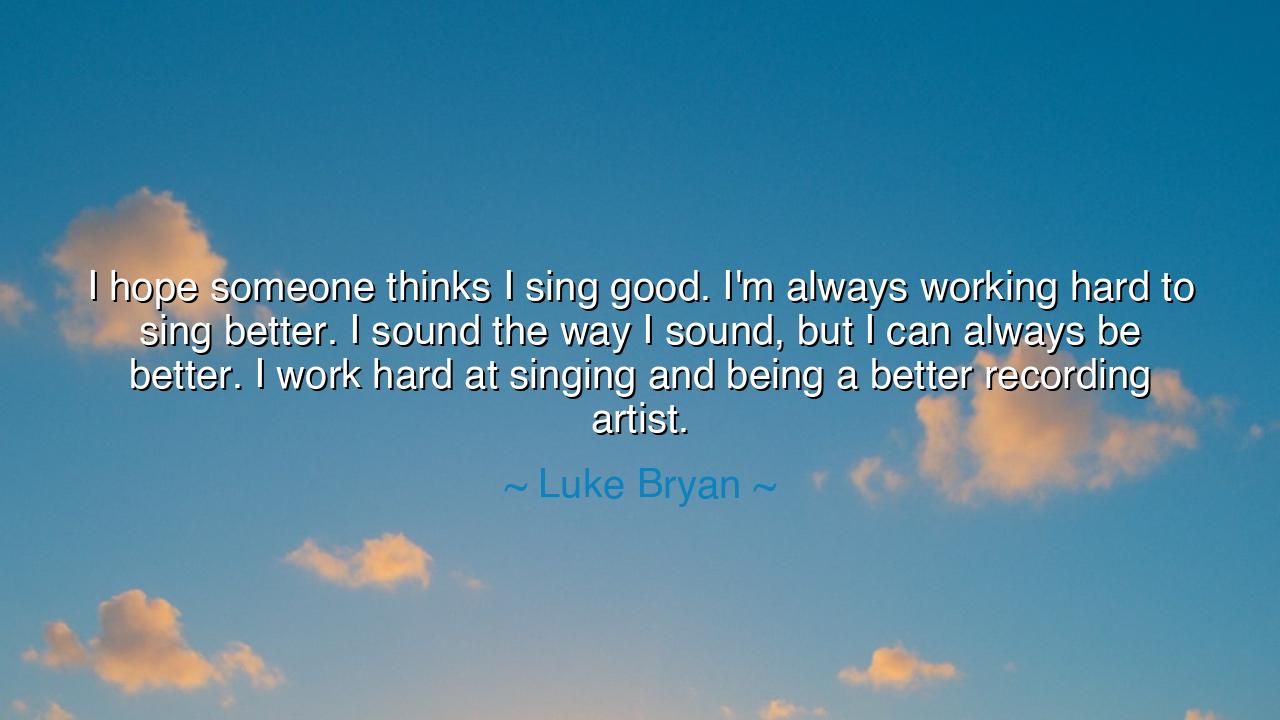
I hope someone thinks I sing good. I'm always working hard to
I hope someone thinks I sing good. I'm always working hard to sing better. I sound the way I sound, but I can always be better. I work hard at singing and being a better recording artist.






In the councils of craft, where apprentices listen for the footfall of masters, hear Luke Bryan speak plainly and without vanity: “I hope someone thinks I sing good. I’m always working hard to sing better. I sound the way I sound, but I can always be better. I work hard at singing and being a better recording artist.” In one breath he binds humility to discipline, talent to toil. The sentence has no perfume; it is the clean scent of sweat. It names the artist’s daily liturgy: accept the voice you were given, and then steward it until it shines.
The meaning is double. First, it is a vow of constancy. “I’m always working hard,” he says—work as verb and weather, work as the drumbeat that carries a life from fairground stages to crowded arenas. Second, it is a pledge of honesty. “I sound the way I sound”—no masquerade, no borrowed accent, no chase after fashions that do not fit. Yet honesty without effort is laziness; effort without honesty is theater. The craft requires both: truth of tone and hunger for growth. That is how a singer becomes not only loud but lasting.
Notice the small hinge-word: hope. It is not a plea for applause; it is a wish that the work be heard as work—tone polished, breath placed, phrasing earned. In country music especially, where story leads and production follows, improvement is a moral choice: the better the craft, the more faithfully the story travels. Bryan has often spoken in this key—of chasing stronger songs, of stretching beyond easy formulas, of resisting the narcotic of repetition. Even at the height of success, he has said aloud that he must keep learning to avoid becoming a caricature of himself.
As for origin, this exact wording is preserved in reputable quotation collections that compile Bryan’s remarks about craft and career. These archives capture the spirit that runs through his interviews: a relentless push to sing better, to grow as a recording artist, to let each album show new polish without abandoning the persona fans recognize. The phrasing fits the larger arc of his public comments about constant improvement and work ethic.
A small parable makes the lesson plain. A young singer in a tiny bar covers a Bryan song and misses the breath before the chorus. An older player leans over the monitor and whispers, “Leave room for the heart.” The kid tries again—support under the long note, consonants softened, vowels warmed—and the room lifts. Nothing magical changed; only attention did. This is the road the quote describes: the pilgrim’s road of repetition, feedback, correction. It is the ancient way of makers in every guild—carpenters truing a joint, coders refactoring a loop, singers placing breath like a mason lays stone.
History offers a sterner witness. The great voices we revere—whether on Opry stages or opera houses—kept notebooks of scales and rituals of rest. They learned that sound is both gift and governance: a river with its own banks, a field that yields only to patience. The ones who endured did what this quote prescribes: they honored the grain of their own wood and still carved. They did not chase someone else’s timbre; they tuned their own until it carried farther and truer.
What, then, shall we take as rule? First, practice with intention: 10 quiet minutes of breath work before you sing; 10 minutes of vowel shaping; 10 minutes of phrasing against a metronome—small fires that warm the voice for the larger blaze. Second, record and review: the phone is a mirror; let it tell you where the pitch sags and the story blurs. Third, keep humility near: ask a trusted ear what they hear, and change something tonight. Fourth, honor rest and care—water, sleep, silence—so that tomorrow’s work has a place to stand. These are ordinary labors; they are also holy.
Carry his cadence like a pocket prayer: I hope → working hard → sing better → be better → faithful recording artist. Let it steady you when praise tempts you to coast, and hearten you when criticism tempts you to quit. For the ancients teach—and Bryan’s sentence agrees—that excellence is not an event but a habit: a humble voice, tuned daily, until the song you were meant to sing arrives sounding exactly like you, only clearer.






AAdministratorAdministrator
Welcome, honored guests. Please leave a comment, we will respond soon